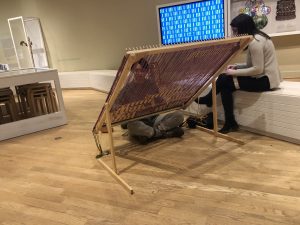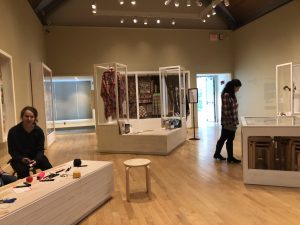by Rivi Feinsilber
 Museum spaces are no longer a place of just observing objects; they are now a place for creating and interacting with them. This is particularly true at the Rhode Island School of Design’s Museum (RISD Museum). The institution believes that art makes a better society from the collections, visiting artists, and events and always in an inclusive and accessible space. Some spaces are designed for collaboration with museum staff, artists, and/or visitors for events. The museum carries out events each month that include lectures, performances, and workshops that range in price from walk-in free to registering with a fee. One event that combines interaction and collaboration between student, museum, visitor, and art is the Repair// Heal: Mending the Self: Our Healing. This public curation event not only allows the visitor to participate in art, but also better understand the space around it and become part of the museum.
Museum spaces are no longer a place of just observing objects; they are now a place for creating and interacting with them. This is particularly true at the Rhode Island School of Design’s Museum (RISD Museum). The institution believes that art makes a better society from the collections, visiting artists, and events and always in an inclusive and accessible space. Some spaces are designed for collaboration with museum staff, artists, and/or visitors for events. The museum carries out events each month that include lectures, performances, and workshops that range in price from walk-in free to registering with a fee. One event that combines interaction and collaboration between student, museum, visitor, and art is the Repair// Heal: Mending the Self: Our Healing. This public curation event not only allows the visitor to participate in art, but also better understand the space around it and become part of the museum.
Led by a student artist from Brown for four consecutive Sundays in March, the  end product was part of her dissertation, Mind, Body, and Community. The project not only fulfills the artist’s need for a “community” object, but also engages the patron in the exhibit, participating in the art of mending objects and being part of something bigger including the gallery and the RISD Museum community as a whole. She chose this space, as healing and mending is the point of the exhibit, but also the curator designed the space with collaboration in mind with seating, tables, and an open atmosphere. Unlike more traditional museums and events that only allow observation, this event made participates including myself feel like an artist and repairer of not only fractured fabric, but also a fractured self and community.
end product was part of her dissertation, Mind, Body, and Community. The project not only fulfills the artist’s need for a “community” object, but also engages the patron in the exhibit, participating in the art of mending objects and being part of something bigger including the gallery and the RISD Museum community as a whole. She chose this space, as healing and mending is the point of the exhibit, but also the curator designed the space with collaboration in mind with seating, tables, and an open atmosphere. Unlike more traditional museums and events that only allow observation, this event made participates including myself feel like an artist and repairer of not only fractured fabric, but also a fractured self and community.
Repair// Heal: Mending the Self: Our Healing was a free open to the public of all ages interactive live object making event that focused on the cathartic act of healing oneself through mending fabric and understanding the concept of gendered activities. Patrons (child through adult) take strips of fabric and decorate them by embroidering and/or using fabric markers. Participates are encouraged to write a meaningful statement on the fabric as well, which ties into the healing portion of the project as the artist stated: “sometimes healing means setting personal goals. Sometimes it means stating one’s values aloud for others.” Here in this event and space, healing is a communal event; that broken becomes whole in new ways. For one moment in time in this particular space, strangers who would not acknowledge each other in a museum are now temporarily part of the RISD Museum’s artistic community. The event made participants feel part of the art but it did not effectively connect to the larger theme of gendered tasks.
The project was effective in making the patron an artist and a curator, but not as effective in connecting to the space and larger concepts. The gender identity theme was not apparent in the activity; my educated guess is that it was assumed that a patron knew that mending clothes/fabric is seen as a gendered activity. Additionally, there was no obvious rebuttal of this inherent assumption. Finally, it took me some time to realize that the space and the project were parallel to each other as the event absorbed my attention. Observing the space, it was clear that was the case for many patrons. People engaged with the project more so than the space. The artist did emphasize the purpose and relation to the space if you asked. A verbal introduction to the event’s purpose including themes and relation to the gallery would help patrons understand the whole objective and make a bigger impact. Nevertheless, it was clear from observing other patrons and analyzing my feelings that the event was successful in weaving diverse strangers together to each other, the space, and the museum as a whole, similar to weaving the fabric into the artist’s rug. Therefore, this event was successful in implementing a public curation type event that aims to make museums and its community more approachable and malleable to patrons’ experiences, knowledge, and skills.
